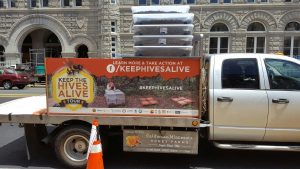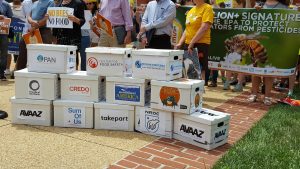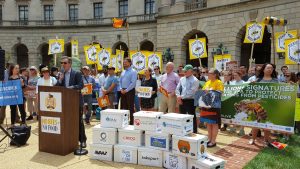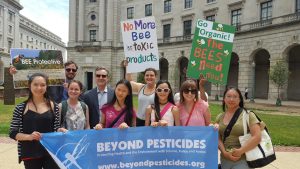23
Jun
Millions of Dead Bees and Over 4 Million Signatures Presented to EPA to Protect Pollinators from Pesticides
(Beyond Pesticides, June 23, 2016) A truck full of dead bees made its final stop yesterday at a rally outside the headquarters of the U.S. Environmental Protection Agency (EPA), culminating a coast-to-coast tour to raise awareness about recent massive declines in pollinators. While the millions of dead bees stayed on the truck, advocates and beekeepers, including Beyond Pesticides, delivered over 4 million signatures urging an immediate ban on bee-killing pesticides.


“In the five years since I started keeping bees, I’ve seen many hives killed by pesticides,” said James Cook, a Minnesota-based beekeeper who has been driving the truck across the country since last Monday. “If some fundamental things don’t change, it’s going to be really hard for beekeepers to adapt to the environment around us.”

Beyond Pesticides staff and friends, including Scott Nash from Moms Organic Market
Bees pollinate most of the world’s most common crops, including summer favorites like peaches and watermelon. But over 40 percent of U.S. honeybee hives die each year, costing the farming and beekeeping industry more than $2 billion annually.
The most significant culprit in the bee die-off is the widely-used class of pesticides called neonicotinoids, or neonics. Last spring EPA began a process to assess four types of neonics and their impacts on pollinators. In January the Agency acknowledged that imidacloprid does indeed harm bees, but the remaining assessments are still outstanding.
“Bees are the most important thing for sustainable food growth, which is one of the reasons I have always sourced 100 percent organic food, free of pesticides that may cause pollinators harm,” said Nora Pouillon, owner and founder of Restaurant Nora, America’s first certified organic restaurant.
“What’s happening today to pollinators is no different than what happened 50 years ago with the collapse of the osprey, bald eagle, and other bird and aquatic animal populations due to the use of DDT,” said Scott Nash, CEO of Mom’s Organic Market. “If we allow the chemical agribusiness industry to continue these short-sighted practices, food costs will increase as food supplies diminish.”
To wrap up their Keep the Hives Alive Tour, farmers, beekeepers and food advocates will meet with officials from EPA, members of Congress, and representatives from the U.S. Department of Agriculture, delivering letters from nearly 200 businesses and organizations urging action on bee-killing pesticides and support for sustainable agriculture.
“The science is clear and convincing. To be truly effective, we need a nationwide policy to protect our pollinators before the crisis gets completely out of control,” said Del. Anne Healey, sponsor of Maryland’s Pollinator Protection Act, the first bill passed in the United States to eliminate consumer use of neonics.
Over the past two weeks Keep the Hives Alive has made stops in California, South Dakota, Minnesota, Michigan, Pennsylvania, and North Carolina. It comes to a close during National Pollinator Week, at a rally where environmental advocates, farmers, restaurant owners and others joined beekeepers to call for action.
“I have never seen any compelling reason to use systemic insecticides,” said Jim Goodman, farmer and owner of Northwood Organic Farm in Wonewoc, Wisconsin. “Crop rotation as part of a diverse mix of crops, pasture and native plants seems to work quite well. Of course it makes little profit for the corporations that manufacture agricultural chemicals — and there is the rub.”
“We have so many losses it’s worse than break-even. It is getting harder and harder to keep bees and make a living,” said Roger Williams, president of the Central Maryland Beekeepers Association. “And if we stop keeping bees, who’s going to pollinate your fruits and vegetables? This can’t go on.”
Additional Action for Pollinator Week
Made by Pollinators Campaign. All week long, select restaurants in the DC-area will celebrate pollinator week by identifying ingredients that are pollinator dependent and showcasing the importance of pollinators to our food system. These restaurants also support local, organic and sustainable practices that take into account whole food and ecological systems. Given that every one in three bites of food is reliant on pollination, the campaign will educate the public on the importance of pollinators and ways to become more involved in protecting bees and other pollinators. For more information, visit www.beeprotective.org.
Participating restaurants include:
- Busboys and Poets
1025 5th St NW (and at other select locations) - Founding Farmers
1924 Pennsylvania Ave NW, Washington, DC 20006 (and at other select locations) - Lavagna
539 8th St SE, Washington, DC 20003 - Tabard Inn
1739 N St NW, Washington, DC 20036 - Restaurant Nora
2132 Florida Ave NW, Washington, DC 20008
Organize a Meeting in Your Community. Utilize a public space, such as your local library or community center, have a house party, or host a pollinator-friendly dinner and view the talk Pollinators, Biodiversity and Scientific Integrity, by Jonathan Lundgren, Ph.D. from Beyond Pesticides’ 34th National Pesticide Forum. This is a perfect opportunity to have a discussion with your friends and neighbors about the serious issue of pollinator decline and what you can do.
Support pollinator friendly legislation. Ask your U.S. representative to support the re-introduced Saving America’s Pollinator Act (SAPA). This is a bill that would suspend the use of neonicotinoid pesticides until a full review of scientific evidence and a field study demonstrates no harmful impacts to pollinators. Contact your Representative now.
Support retailers that are providing safer alternatives. Local ACE franchises are already proving that hardware stores don’t need to sell neonics or any other toxic pesticides in order to be financially successful. Eldredge Lumber and Hardware and Kittery ACE of York, Maine are consciously stocking their shelves with organic compatible products, and providing seeds and nursery plants that are not treated by bee-toxic chemicals. Visit your local hardware or garden retailer and ask them to also to stop selling neonicotinoids and other bee-toxic pesticides, and source more organic alternatives, or give them a call today! You can also find your own source of organic seeds and plant starts by going to Beyond Pesticides’ Pollinator Friendly Seed and Nursery Directory.
Tell EPA to do more for pollinators. EPA has acknowledged that pesticides are a problem, but little meaningful action has been done to reverse pollinator declines. Bees need real protections from toxic pesticides now. It’s time for EPA to get serious about protecting bees by suspending neonicotinoids.
Make Change Happen in Your Community. Armed with allies and resources from your video screening party, go to your elected official and ask them to introduce the Model Pollinator Resolution and/or our Model Lawns and Landscapes policy.
—Get the Model Community Pollinator Resolution here, and our Model Lawns and Landscapes Policy here.
—For more information, see our BEE Protective webpage, or get in touch with us.
For more information on what you can do to protect pollinators, see www.beeprotective.org.
All unattributed positions and opinions in this piece are those of Beyond Pesticides.










